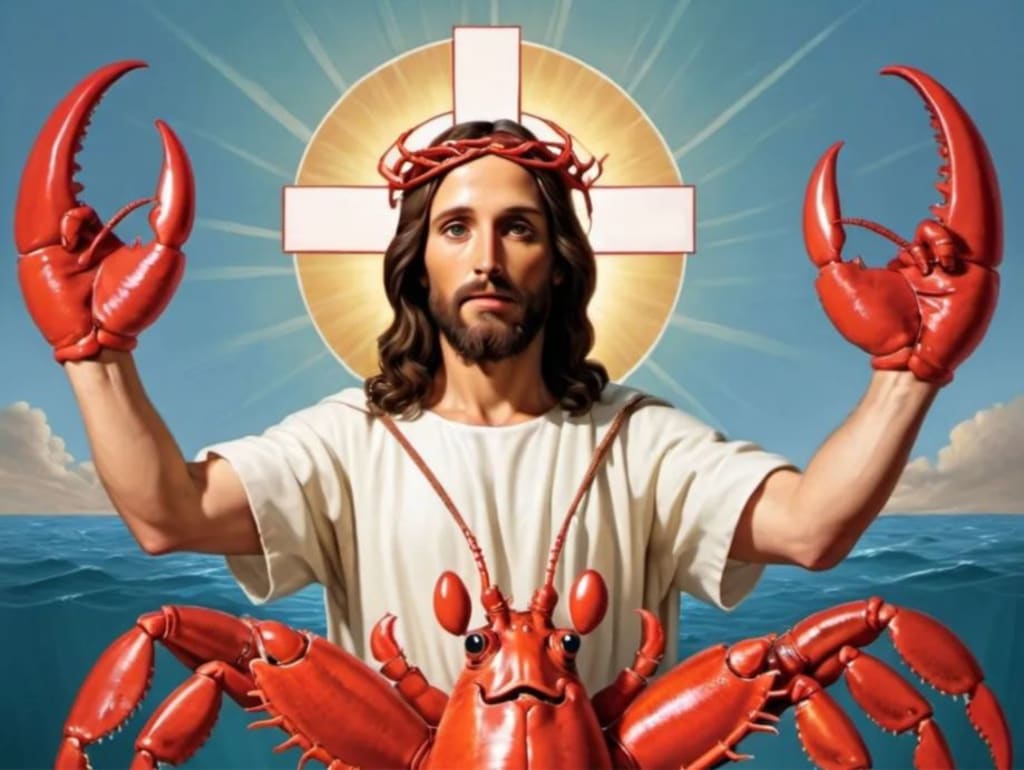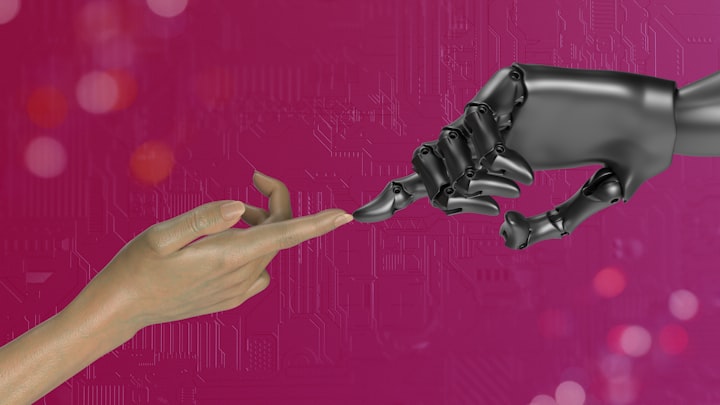AI-Generated Content and the Dead Internet Theory
An Exploration Into The Conspiracy Theory That Could Potentially Become True

It’s weird and confusing to live through a major technological revolution. The sudden economic changes permeate all aspects of society: careers, culture, relationships, family life, purchases, and even leisure. Since the 90s, we’ve been subject to several life-altering, major technological shifts. From the internet to cell phones, to social media, our general rate of advancement has increased fast enough to give even the most tech-savvy folk a fair bit of whiplash as they navigate through all the changes. As time has marched on, our ability to innovate has picked up pace, making for some strange culture shocks and, not surprisingly, a general rise in dread about the future.
AI’s invention and use have recently gripped this flavor of cultural dread. Long a dystopian science fiction plot device, AI becoming commonplace feels like we’re seeing the start of a Terminator future. As a result, a large swath of folks with future anxiety started communicating, wondering, and taking a stab at predicting what might happen next.
Enter the ‘dead internet theory’: the internet’s new conspiracy theory that’s making its rounds through social media and growing in popularity beyond the fringe forums it began in.
What is the Dead Internet Theory?
Originally considered a fairly fringe conspiracy theory, the dead internet theory is the idea that you, the reader of this article, are the only real person online. The theory claims that the rest of the interactions you have on forums, websites, and social media sites are all from bots. Though, yes, there is certainly automation and bot-run content on social media sites, the ‘dead internet’ believers of yore took the idea a step [or multiple steps] further, believing that everything they see is a result of bots attempting to fool them into believing a real person is on the other side of the screen.
Of course, if you’ve ever spoken with a friend of yours in person about something they posted online, you know this isn’t entirely true. At the very least, you probably know that your friends and family are interacting with their online accounts towards your content and you do the same to theirs. But, what of the other accounts you engage with? The verified Twitter accounts, the customer service representatives, and even the posts on this website can be strikingly difficult to know for certain that the person behind the content is really a person, according to proponents of this belief.
This conspiracy theory is a relatively new one, likely originating on 4chan or a similar website less than a decade before the writing of this article. But, despite its short lifespan, it has begun to gain a significant amount of traction in light of the increase in LLM-created writing and AI-generated images flooding every corner of the online world. Now, the idea of a ‘dead internet’ has generally shifted, where those who believe it do not believe that it has already happened, but that it will soon, when AI-content is generated to optimize itself for the algorithms that cannibalize the space available, effectively shutting humanity out from the internet.
The Dead Internet Theory Isn’t a Problem…. Yet
After users began to notice bot responses in droves under trending posts on X and other social media sites, many began to believe we were seeing the beginning of the dead internet. Fortunately, current estimates indicate that the majority of internet traffic (50.4%) is still from real humans (You’re not alone! Hello, real person!). We have seen, however, a steady increase in the amount of bot activity online every year since 2013.
A good portion of the reason folks are concerned about this ‘theory’ now is due to just how much the culture of the internet has changed over the last few decades. The internet used to be a lawless place, not bound to the rules of civil, public society as other more traditional forums. Because of the introduction of corporations, commercialism, and general opportunities for money-making, however, online spaces have become cleaner, more restricted, and sterile. For those old enough to remember the Wild West internet days of decades past, this cultural shift into polite corporatism can magnify the feeling of how many bots are out there.
Thankfully, even with the introduction of AI generative tools and more sophisticated bots, experts still believe that the vast majority of popular and trending content is human-created. At the moment, it seems that the extant bots are attempting to ride the coattails of trends and popular influencers, they’ve yet to outcompete us in wit, engagement, and interest.
So it isn’t a problem right now, and those worried that they’re alienated and abandoned as the sole internet user on Earth, worry not. Even with conservative estimates of internet bots, you and I are but two of at least three billion real, human internet users. But the growing concern of internet citizens is not unwarranted. With more and more bots being released, and more and more non-human generated content showcasing itself on the front pages of Google images and showing up on social media FYPs, there’s a valid problem emerging here: we may soon be outnumbered by bots which could generate fast enough to outnumber human-generated content.
At some point, if it isn’t handled, we may be flooded with so much low-quality bot content that it could ruin our experience of a website or platform. It is already arduous to scroll through some sites to find something quality enough to watch or engage with. If bots continue unfettered, increasing in number and more rapidly producing content of all sorts, the cost will outweigh the benefit so much that users will stop using them. Without action now, sites will go extinct. At this turning point, if we do not adapt, we could ruin the internet for ourselves.
Why Is Ruining the Internet a Huge Deal?
Think about the incredible impact that the internet has had on society in the last few decades. It has touched nearly every sector, nearly every bit of our experience, radically transforming it. It has become a valuable way to stay connected with long-distance friends, learn about niche subjects, and discover diverse perspectives, making humanity more connected to each other than ever before. For some of us, this strange and wonderful technological tool has become the way we economically sustain ourselves, too. Internet accessibility has shifted the way we shop, the way we consume content, how we learn, the way we create, and how we perceive ourselves and the communities we’re a part of.
None of this would have been possible without the inherent trust we have collectively put into the internet, that we’re talking to real people at least some of the time, that the pictures are honest or detectably dishonest, that the writing by experts published to scientific sites is truly written by those experts, that the people you engage with act with humanity in mind. That principle has become part of the unspoken online social contract and has been a leading cause of dramatic moments online when someone breaches that contract.
If the internet dies, losing its humanness in favor of undetectably unreal content shared and liked by non-human users, our trust for sources available on it has the potential to die with it. Effectively, a dead internet could lead to paranoia around any content available online, distrust towards other users one engages with, and a lack of belief in anything posted. Consider already how many accusations are being hurled in internet communities about fake content, bot users, edited photos, misinformation, and outright lies.
‘Killing’ the internet with bots could result in a cultural regression as our channel to communicate globally with one another is severed. The knowledge provided by the internet has brought power to so many, power to organize, learn, shine a light on human issues, and shift public sphere perspectives, that’s an invaluable tool. We have to do all we can to keep it.
Preventing the Death of the Internet
To prevent the dreaded dead internet from becoming a reality, we need to create a structure now that prevents bot and AI-generation flooding. That sort of structure will need to come from the websites and platforms we choose to use, both in how they identify and address non-human content. At the very least, they must make changes to better identify when AI is being used and communicate this to users so as not to spread misinformation. It would be even better if companies allowed AI content to be filtered out by users or granted AI use some algorithmic penalty that de-incentivizes the use of it without disclosure.
Banning all AI content on every website isn’t the answer and, frankly, it isn’t feasible (and, if we use the tools ethically, they could even be cool and interesting!). But, we must unearth a way to emphasize quality over quantity in content spaces so that human livelihoods, education, and entertainment aren’t affected by the influx.
It would be ideal if all those on the internet agreed to disclose when AI content or bots were used. Unfortunately, people lie on the internet (shocking, I know), and suspecting such honesty from billions of users is not exactly reasonable. The solution will not lie in what individuals do from here on but in how companies manage to filter. Our power is in platform attendance, and voting by spending our time in online spaces that keep human and non-human content identifiable.
The corners of the internet that begin these sorts of initiatives and continue identification as AI-generation tools become better have a chance to survive past this weird AI boom. Websites that do not attempt anything, however, will likely see less and less human traffic as time goes on. If prominent online companies fail to adapt, they will become extinct, and we will see a radical shift in the places real people gather online.
--
We face strange times ahead, indeed. On the precipice of a massive cultural internet shift, we must do all we can to ensure that shift keeps portions of the internet alive with humanity. What we see as the internet today may not be familiar to the online space of the future. If Google is unable to clear its image search of AI images, the tool may become useless, an artifact of a bygone era. If Facebook cannot stamp out bots commenting on AI pictures, that may become all that Facebook is — a graveyard of pseudo-human interactions. But, should these and other giants fall, it will open space for new communities to rise, new giants to be innovated and coded, and launched.
I, for one, have faith in the indomitable ingenuity of humankind to find a way forward that preserves our ability to express, to create, and to find glimpses of each other across the web.
--
Cross-posted from Medium. Follow my main account for new articles every other Friday!
About the Creator
Olivia L. Dobbs
Science Enthusiast, Naturalist, Dreamer, Nerd.
I crosspost my Medium articles here :)
You can find my main account on Medium: https://medium.com/@oliviadobbs13
Check out my science! -> bit.ly/DobbsEtAl
Enjoyed the story? Support the Creator.
Subscribe for free to receive all their stories in your feed. You could also pledge your support or give them a one-off tip, letting them know you appreciate their work.






Comments (1)
Nice reading. Liked it.